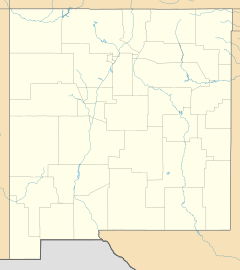Ancho, New Mexico facts for kids
Quick facts for kids
Ancho
|
|
|---|---|
| Country | United States |
| State | New Mexico |
| County | Lincoln |
| Time zone | UTC-7 (Mountain (MST)) |
| • Summer (DST) | UTC-6 (MDT) |
Ancho is a small, quiet place in Lincoln County, New Mexico, United States. It's not a big city or even a town with its own government. Instead, it's an "unincorporated hamlet," which means it's a tiny community without a formal town council. Ancho is located in the desert, about two miles east of a main road called U.S. Highway 54. It's also north of a town called Carrizozo. Today, there's a church in Ancho, but you won't find any shops or services there. Many of the old buildings and land that were once part of the community are now on private property.
Contents
Ancho's Past: A Look Back
The Start of Ancho: Bricks and Trains
Ancho started to grow in 1901 when a railway line arrived. People also discovered special types of earth nearby: gypsum and clay. These materials were perfect for making bricks! Because of this, the Ancho Brick Plant was built. It began making bricks and grew to have 16 large ovens, called kilns, for baking them.
Helping San Francisco Rebuild
The bricks made in Ancho were very important. In 1906, a huge earthquake hit San Francisco, California. The Ancho Brick Plant sent many tons of bricks by train to help rebuild the damaged city. This shows how important Ancho was at that time.
The End of an Era: Ancho's Decline
However, things changed for Ancho. In 1921, a new highway, Highway 54, was built and moved two miles away from the town. This was a big problem for the brick plant, and it had to close down. This was a huge blow to Ancho's economy.
After the brick plant closed, the town slowly started to shrink.
- In 1955, the local school in Ancho closed its doors.
- Four years later, in 1959, the train station stopped operating.
- Finally, in 1969, Ancho's Post Office closed.
Ancho Today: Keeping History Alive
Even though many businesses left, Ancho's story didn't completely end. Today, the people who still live in Ancho have worked hard to fix up many of the old buildings. They have restored important pioneer buildings, including the old school and the train station. This helps keep the history of Ancho alive for everyone.
 | Janet Taylor Pickett |
 | Synthia Saint James |
 | Howardena Pindell |
 | Faith Ringgold |



